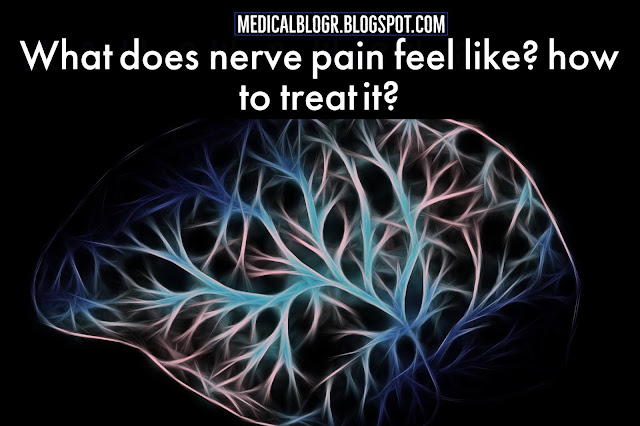What does nerve pain feel like? how to treat it?
Nerve pain is often called in medical term as
neuropathic pain. It is complex and could occur due to various reasons such as
nerve damage, irritation or destruction.
Most people use a common set of words to
describe their chronic nerve pain which are described as follows:
●
Burning
●
Tingling
●
Sharp
●
Prickling
●
Stabbing
●
Shooting
The intensity of pain may vary. For some, it
may feel like mildly bothersome pins and for some, it may feel like a hammer
hitting hard, which is unbearable. Usually, nerve pain is either localized or
referred to a particular location in the body.Consulting a doctor like Neurologist
is recommended.
is recommended.
Terminology describing the intensity
The intensity of chronic nerve pain may vary
among people. Some medical terms are used to describe the sensation.
●
Allodynia: After the stimulus, a sudden
experience of pain which should occur under ordinary circumstances is called
allodynia.
●
Dysesthesia: It describes some sort of
impairment in the sensation. The pain which occurs when there is no stimulus
present at all which is called spontaneous pain.
Severe symptoms
Like other types of chronic pain, there are
other symptoms also present in addition to the pain. On the occurrence of the
following symptoms, the person may be suffering from the nerve damage:
●
Muscle weakness
●
Partial or complete paralysis
●
Changes in skin colour or texture
●
Suffering from depression or
anxiety
●
Loss of feelings
Common Treatments
The treatments suggested by the physicians may
vary from person to person. According to a neurologist in Chennai, Neuropathic
pain can be treated with the following treatments:
●
Adjuvant analgesics -
antidepressants and anticonvulsants.
●
NSAIDs
●
Nonsteroidal anti-inflammatory
drugs
●
Physical therapy
●
Damaging certain parts of the
nerve
●
Multi-modal treatment
Elaborate medication used to treat nerve pain
are as follows:
Counter
pain medication
Nonsteroidal and inflammatory drugs used to
treat neuropathic pain. However, many people have also reported that it is not
effective in treating neuropathic pain.
Nerve
blocks
The doctors may inject steroids, local
anaesthetics or other medicines which can be used to treat the nerve which is
responsible for sending the pain signals to the brain. The injected medicines
are temporary in effect so they must be used in repeated orders to keep working
well.
Implanted
device
A surgeon is required to conduct the
implantation of a device in the body. It could be fitted in the brain or in the
spine. Once a device is fitted in the body then it can send electrical impulse
into the brain, spinal cord, or nerves. This device used to in those patients
who haven’t responded well to the alternative options of treatment.
Lifestyle
treatments
The physicians may recommend certain ways to
treat the neuropathic pain which should be followed religiously to help get
relief from the symptoms. They may teach certain technique for sitting,
standing, stretching, and moving that may prevent pain.
Multimodal
therapy
Neuropathic pain treatments may or may not
suit a person. A prolonged approach can be effective to manage the condition. A
combination of physical treatment, medicines, psychological treatment, surgery
or else the implant of the device may be used to bring about a beneficial
result for the patient.
If the neuropathic pain is neglected for a
long period of time then the condition may worsen and lead to a severe stage, including depression, sleeping
anxiety, or even paralysis. Early stages of precaution are recommended to deal
with the problem.
Consult Fortis Malar Hospitals for Neurologists in Chennai
Click here to know more
Address: No. 52, 1st Main Rd, Gandhi Nagar, Adyar, Chennai, Tamil Nadu 600020
Phone: 099625 99933




Comments
Post a Comment